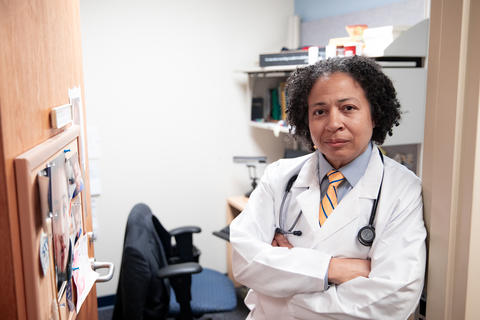
Inspirational Medicine

Dr. Renée Crichlow in the Broadway Family Medicine Clinic.
For the past seven years, members of The Ladder program have been gathering every second Saturday of the month at the University of Minnesota’s Urban Research and Outreach Engagement Center (UROC) to spend two hours together eating lunch, sharing stories and doing a lot of hands-on learning. A “society of medical scholars of all ages and experience levels,” the program connects fourth- through twelfth-graders, primarily from Minneapolis’ Northside, with college students and health care professionals, including medical school residents, interns and practicing physicians.
In partnership with UROC, the cascading mentorship program offers members of the group an opportunity to learn from each other on the rungs of the ladder ahead of them. The goal is to build character and confidence in a way that encourages youth to stay in school and pursue careers in medicine. Mentorship has always been a good way to foster career and academic success because, as the program’s founder Renée Crichlow says, “No one gets anywhere by themselves.”
Crichlow should know. A family medicine physician at Minneapolis’ Broadway Family Medicine Clinic and assistant professor and director of advocacy and policy with the University's Department of Family Medicine and Community Health and a University of Minnesota Physician, Crichlow started The Ladder, hoping to give others the same kind of life-changing encouragement she received as a young woman who dreamed of being a doctor and needed help staying on her path. “I always had teachers and coaches telling me that I was capable and would go far,” Crichlow recalls, explaining that their faith in her helped her believe in herself.
But the goal of becoming a doctor was hard to hold onto when financial struggles kept derailing Crichlow’s education. She was working as a phlebotomist when a colleague reminded her that she’d once planned on going to medical school, and wouldn’t she one day be disappointment if she didn’t? It was the push she needed to enroll at the University of California, Santa Cruz. Finally, she earned her undergraduate degree at age 27 with the help of an NIH scholarship, and was well on her way to becoming the doctor and mentor she is today.
Like other participating physicians who say The Ladder’s monthly meetings help prevent burnout and remind them why they love what they do, Crichlow enjoys talking and working with the youth, who are excited to learn things like how do CPR, use a stethoscope, or read a chest X-ray. Watching as college students mentor elementary- and high school-age youth, she has a lot of moments when she sees how the right kind of encouragement turns on a light bulb and makes someone think, “Yeah, I can do this.”
And that’s the biggest thing, Crichlow says, helping kids see that persistence pays off and how, in many ways, they are not that different from the people who are ahead of them in life. “For me, we are succeeding if, every time we end The Ladder meeting, kids know they can do stuff,” she says. “We are currently matriculating fewer African Americans into medical school than we were in 1978. Getting a kid to use a stethoscope in eighth grade might just give them the confidence to go on to become a doctor.”
Already, The Ladder has increased minority recruitment at the North Memorial Family Medicine Program, in part because medical students were inspired by the time they spent with The Ladder program. Additional chapters, based on a toolkit created by Crichlow, are already operating in St. Paul and Dayton, Ohio, and more are in the works. All embrace the group’s motto: Lift as you climb. Build as you grow. “I believe everyone at their core is a compassionate enlightened being and we are here to teach each other,” Crichlow says. “I am constantly inspired by everyone I meet, and every one of these kids inspires me. There is so much potential.”